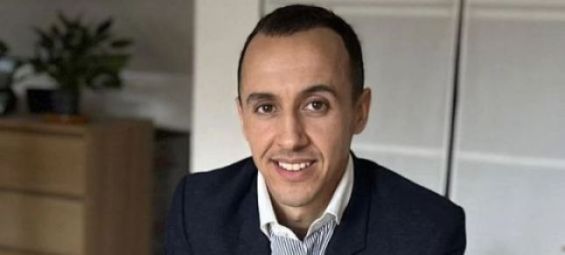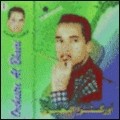Born on April 5, 1981, Youssef Badr grew up in a large family of Moroccan origin, where he enjoyed a «happy childhood». «There were five of us, four boys and one girl», he told Yabiladi. His two older brothers and older sister, all born in Morocco, joined their father in France in the 1970s, thanks to the family reunification program. Like many other Moroccans at the time, their father had emigrated to France to find work. Initially settled in Levallois, a middle-class town where Youssef was born, the Badr family moved to Val-d'Oise, a few kilometers away.
Youssef's childhood mirrored that of many immigrant children, marked by a strong emphasis on education. His parents left no room for failure at school. His father, a factory worker, and his mother, a cleaning lady, embodied sacrifice and perseverance, values they instilled in their children, constantly repeating: «It's out of the question for any of them to go astray». This parental injunction translated into great diligence and hard work on the part of the children, all determined to excel in their studies and honor their parents' sacrifices.
«We are miracles»
However, the lack of academic support at home made the school experience difficult and uneven at times. «Teachers indulged in things with us that they would never have allowed themselves with other students», Youssef confides, referring to the derogatory comments and hasty judgments of some teachers. Cultural and socio-economic differences compounded these discriminations.

One history and geography teacher stood out for her overt racism. «She was notoriously racist», says Youssef. The teacher went so far as to refuse to allow him to speak, exploiting the absence of Youssef's parents from meetings to impose her contempt. «In fourth grade, she did everything she could to make me repeat the year», he recalls angrily. In ninth grade, another teacher, this time in French, was hardly more benevolent. Any correct answer by Youssef would be met with disdain, as if she were witnessing an «extraordinary phenomenon».
Despite these obstacles, the young student managed to break through the invisible but oppressive barriers. When a classmate announced that he had been admitted to high school, Youssef felt «a mixture of relief and disbelief», wondering why he had almost been directed towards an apprenticeship when his results were so good. His questioning, tinged with bitterness, revealed the absurdity of the prejudices he had faced and the inner strength he had to mobilize not to give in. «Somewhere along the line, I tell myself we're miracles», he says.
A difficult transition to high school
In high school, the difficulties worsened. «Two worlds collided: me and my principal teacher,» says Youssef. Because of behavior deemed inappropriate, he was excluded for three days. «The truth is, looking back, if I had to do it again, I'd do the same thing,» he admits frankly, referring to the contemptuous way she spoke to him. This friction was not simply a disagreement between student and teacher, but a manifestation of systemic racism where prejudice dictated the treatment of students.

The head teacher openly adopted a degrading attitude towards students from immigrant backgrounds. Sometimes, she would say to them, «look at the back of the class, the nice bunch of clowns. If anything happens, you don't have to look far.» Of course, she would only talk to the «Arabs and blacks in the class,» fueling the feeling of stigmatization. They were not only confronted with individual prejudice but with a kind of systemic branding that confined them to an image of «dunce» or even potential delinquent.
Final year of school, finally a way out
Emerging from a sophomore year in which confidence in adult figures had been shaken by experiences of racism and discrimination, Youssef became highly suspicious. «It had an impact on my trust in adults,» he says, before adding, «I realized that adults can break you in half if they want to.»
Racism and discrimination are not always directly perceptible, but their impact is profound and pernicious. In the face of such humiliation, «we're often accused of victimizing ourselves or exaggerating the situation,» says Youssef bitterly. Yet minimizing the experiences of those directly affected by these phenomena is a defense mechanism that prevents a true understanding of the problem. Only those who have lived it can fully grasp it. «It's a deeply personal, almost inexpressible experience,» he admits.

Fortunately, an economics and law teacher changed all that. Unlike his other teachers, he gave him sympathetic attention and recognized his «fair value.» This teacher gave him a lot of advice, listened to him, and steered him towards law. For the first time in a long time, Youssef found himself face to face with a reassuring figure who gradually restored his confidence in adults and in the educational institution.
Far from representing mere academic validation, his baccalaureate was a victory over a system that had never made things easy for him. Hard work and resilience in the face of oppression ultimately led to a success that enabled him to leave this difficult environment behind. «High school had left me with a deep resentment, so the announcement of the results was greeted as a deliverance,» he recalls, reliving that same relief.
«If you want to decide things, you have to be a magistrate»
After high school, Youssef Badr encountered closed doors at business schools due to his first-year report card. This led him to the pursue a shorter, two-year diploma (IUT) in Legal Careers at the Faculté de Villetaneuse.
It was only later, «in his fourth year of law school,» that he decided to become a magistrate, following a decisive meeting with one of his professors. «Right from the start, he believed in me, pushing me to excel,» explains Youssef. His support steered him towards a career he might never have envisaged. The teacher, aware of Youssef's ambitions, confided in him: «Being a lawyer is all very well, but if you want to decide things, you have to be a magistrate.»

Aware of the financial sacrifices required, Youssef's family supported their son and brother unreservedly. «My family knew it was going to cost a lot of money, require sacrifices, but they were very supportive,» he declares gratefully. «The advantage I had was that I was the second to last in a large family. My two older brothers gave us a lot of financial support.» His mother, for her part, struggled to provide for his academic needs, including law books. Thanks to this support and his perseverance, he was awarded a merit scholarship in his fourth year.
His student years were also punctuated by various jobs, from construction to leafleting. «During my studies, I went through all sort of student gigs,» he says. Working at the Argenteuil market helped strengthen his resolve, declaring, «when you arrive at 5 am in the middle of winter, selling clothes all morning to earn 120 Francs, you understand that you have to go as far as possible in your studies.»
The magistrates' school, though complex and demanding, was more auspicious. «I didn't make many friends, with a few exceptions, but I'm happy with my magistrates' school,» he remarks with understated satisfaction. He describes himself as «a chameleon», able to adapt to different environments.
«When you've spent five years studying and two years preparing for the ENM competitive exams, you can evolve in any environment. Of course, the students didn't come from the same background, but we had the same knowledge and the same abilities. I had nothing to be ashamed of.»
Today, Youssef Badr sees his career as tangible proof that studying, even under difficult conditions, is accessible to all. «I came out pretty well ranked, so that's proof that I earned my spot fair and square. That's what I keep telling the students I work with every day: that studying is for them too,» he insists.
A brilliant career path
After entering the École Nationale de la Magistrature (ENM) in January 2008, Youssef Badr began his judicial career as a deputy public prosecutor in Meaux, where he worked from 2010 to 2012. He continued his career as deputy public prosecutor in Bobigny, from 2012 to 2016, before joining the Paris public prosecutor's office for a short period from 2016 to 2017.

His career took a new turn when he was appointed spokesman for the Ministry of Justice from 2017 to 2019, a role in which he distinguished himself by his ability to articulate the Ministry's positions with clarity and precision. He then turned his attention to training, holding the position of trainer at ENM, where he taught judicial communication from 2019 to 2022. Since September 1, 2022, Youssef Badr has held the position of Deputy First Vice-President in Bobigny, where he presides over the 18th Correctional Chamber.
La Courte Échelle: the project of a lifetime
In 2021, Youssef Badr launched a project that had always been close to his heart: La Courte Échelle, an association founded on the idea of offering equal opportunities to students from disadvantaged backgrounds. The project, which he had been thinking about for a long time, came to fruition in March 2022.
«Startingout fromnothing, I succeeded in the competitive examination for the magistrature. But many students were reluctant to take the plunge. The students I worked with were often coming from rich and influential backgrounds. I thought it was necessary to create a project to enable young people with profiles similar to mine to follow the same path.»
The idea for this association also stemmed from a tragic personal ordeal. The loss of his older brother in February 2021, at the age of forty, was a «trigger» for Youssef. «I realized that life is extremely short. If you have a project in mind, you have to carry it out at all costs,» he confides, adding that this project is a tribute to all that Driss had done for him.
Generally speaking, the association is a story of solidarity. His family and friends help and support him as much as they can. His sister, for example, takes care of the administrative side of things, while Ronan, a friend and communications professional, helps him «pro bono». «Two girls from his communications agency manage our social networks. For me, it's an incredible opportunity,» admits Youssef.
La Courte Échelle: an association for the little ones
La Courte Échelle aims to prevent students from dropping out of school and offer them support in their academic career. «The aim is to prevent students from dropping out, especially when they are faced with difficulties,» explains Youssef. The association helps find internships, prepare for competitive exams, and offers mentoring by professionals. «If there are legitimate people for these professions, it's those to whom life has given nothing,» he stresses.
Since its inception, La Courte Échelle has supported nearly 7,000 students across France, extending its scope beyond the initial departments. Youssef Badr, in charge of day-to-day management, «handles all requests, exchanges with students and puts them in touch with professionals.» Today, the association has between 800 and 1,000 sponsors.
However, Youssef recognizes the need for a fresh look at the association. «It's essential to re-evaluate processes and take a step back to continue helping other students effectively,» he stresses.
His parents are proud of his commitment. Originally from the village of Tagouriant, south of Tiznit, they remain very attached to their roots. «I think both my parents are proud of what I'm doing, even if, because of our culture, we don't express our feelings very much,» confides Youssef.
French-Moroccan heritage: passing on to future generations
Aware of the challenges and sacrifices that have marked his own journey, Youssef in turn strives to instill the importance of school in his children. «If you want to be free later, to do what you want, you have to be good at school,» he reminds them. However, the magistrate also expresses his sincere desire not to impose his expectations. «I hope what I'm doing won't crush them,» he worries, revealing his willingness to support his children in their personal aspirations, without undue pressure. For him, his children's happiness is the absolute priority. «What matters to me is that they are happy. I'll always be there for them,» he assures with deep conviction.
Every day, Youssef is careful to pass on his dual culture, which he sees «as a richness,» through the practice of his mother tongue with his children, but also through regular visits to Morocco and shared stories about his family roots.




 chargement...
chargement...











